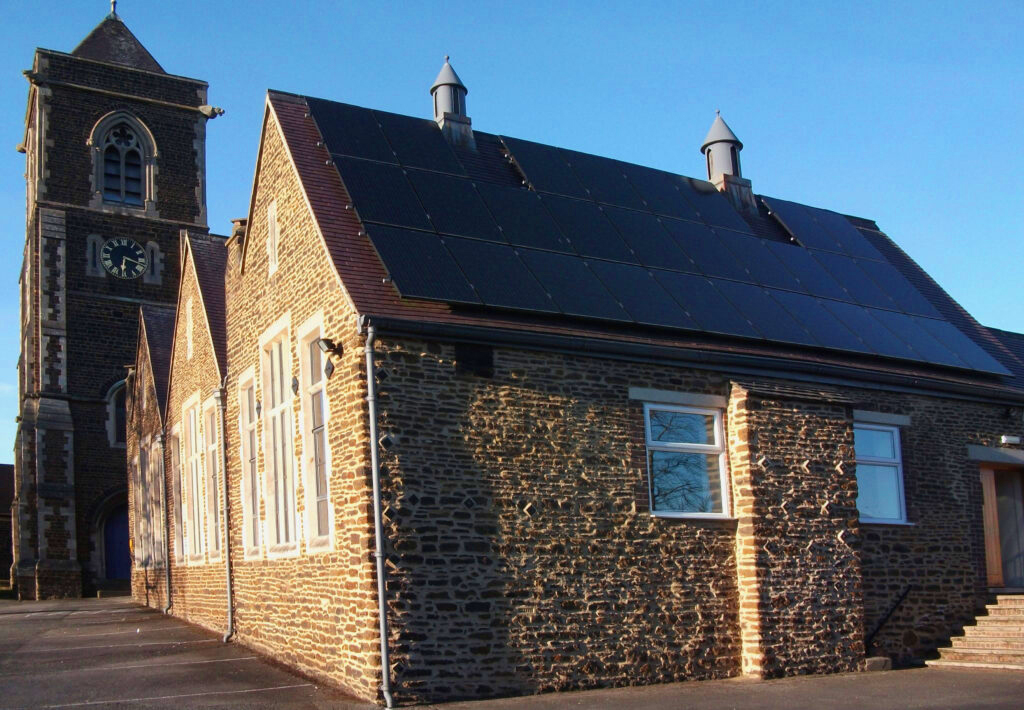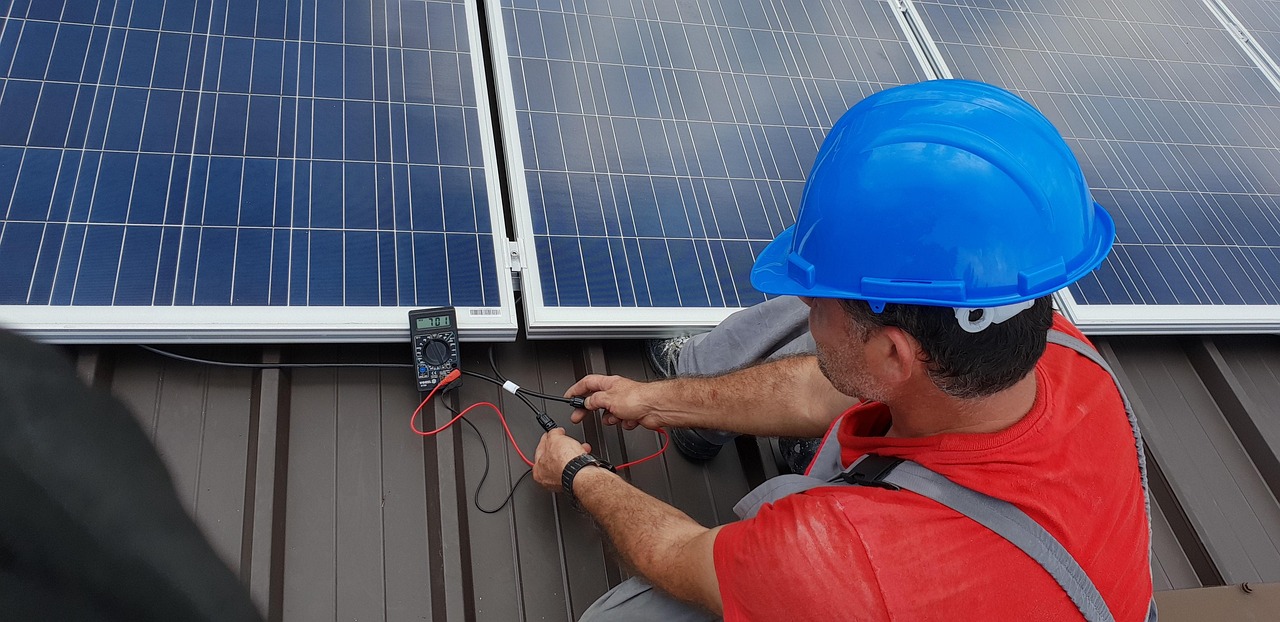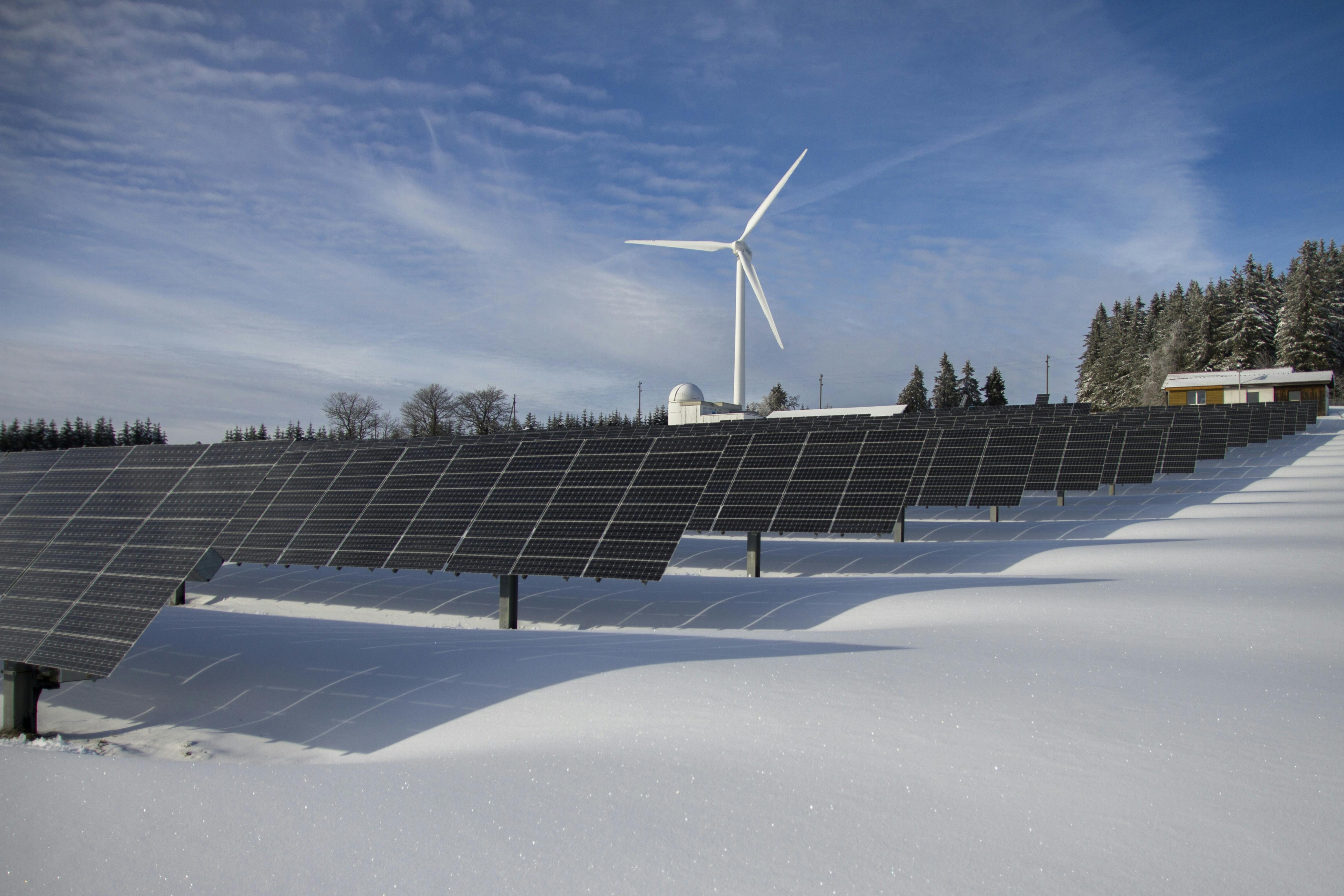The Cost of Solar Panels In UK 2026 - Use Our Calculator
Solar panel costs in the UK vary. Use our cost calculator to work out yours, or read our guide for a complete breakdown.

When considering the switch to renewable energy, understanding solar panel costs is the first step. Solar installation costs vary widely depending on many factors so for the most accurate cost estimate we’d recommend using our UK solar cost calculator - this will give you the breakdown that you see above.
However, if you’ve just seeking the average costs of solar panels in the UK, they are as follows:
For a small system, you can expect to pay around £6,000 to £7,000, while larger systems typically range from £8,000 to £9,000. However, several variables, such as the type of panels, roof structure, and installation complexity, can affect these costs.
This guide offers a more comprehensive look at the costs of solar panels in the UK, from the initial purchase to installation and ongoing maintenance. With the help of our solar panel cost calculator, you’ll gain clarity on what to expect when installing solar panels for your home.
How To Calculate Solar Panel Costs
To calculate the cost of solar panels for your specific requirements, follow these three easy steps:
- Access MakeMyHouseGreen’s solar panel calculator by clicking the button above.
- Enter your postcode.
- Provide answers to a few straightforward questions.
How much do solar panels cost for a house in the UK?
A smaller solar panel system with 10 panels typically costs around £6,000 to £7,000, while a larger system with 20 panels is likely to be in the range of £8,000 to £9,000, excluding a battery.
The total cost of installing solar panels includes three key components:
The Solar Panel System: This includes the photovoltaic (PV) panels, solar inverters, and all the necessary equipment that allows the system to generate solar power.
Installation and Labour Costs: Installation requires skilled professionals to ensure the system is properly fitted and functioning at its best. The complexity of your roof and the specific installation needs can influence these costs.
Ongoing Maintenance Costs: While solar panels are low-maintenance, it’s important to consider occasional upkeep to ensure optimal performance. This may involve cleaning the panels, checking the inverter, and addressing any issues that could impact efficiency.
How much does the solar panel system cost?
The cost of a solar panel system in the UK can vary significantly based on its size and the type of panels used. Solar panels are rated by their power output in kilowatts (kW), and the system’s size directly impacts both cost and energy production.
Here’s a detailed breakdown of the average cost of solar panels in the UK based on house size:
- Small Houses (1-2 Bedrooms): A 3kW system, ideal for smaller homes, typically costs between £6,000 and £7,000.
- Medium Houses (3 Bedrooms): A 4kW to 5kW system, suitable for medium-sized homes, generally costs between £6,500 and £8,000.
- Large Houses (4+ Bedrooms): Larger homes usually require a system of 6kW or more, with costs starting at around £8,000 and potentially reaching up to £10,000 or more.
The system's size, determined by its kilowatt capacity, indicates how much power it can generate. Smaller systems with lower kW output are more affordable but generate less energy, while larger systems with higher kW output come with higher upfront costs but can produce more power, leading to greater long-term savings.
These figures are estimates and can vary based on several factors, including the quality of the solar components, the complexity of the installation, and your location. For a tailored estimate, use our solar panel calculator, which factors in your home’s specific needs and location.
How much does the solar panel installation cost?
Solar panel Installation costs can vary depending on several factors, including the complexity of the installation, the size of the solar panel system, and the steepness of your roof. Typically, the cost of installing your panels will be included in the price of the panels themselves.
To get an accurate cost estimate for the installation of solar panels on your property, we recommend using our solar panel cost estimation tool.
Maintenance and Long-Term Costs
Regular maintenance is a crucial aspect of ensuring the longevity and efficiency of your solar panel system. While solar panels are generally low-maintenance, they still require periodic checks and cleaning to operate optimally.
By investing in solar panel maintenance, you can potentially extend the lifespan of your panels and maximise their energy production. Maintenance costs are relatively low, and can sometimes be nothing if you perform the tasks yourself. These include cleaning, checking for shading issues, inspecting electrical connections, and ensuring that the panels are secure.
Some homeowners choose to hire professional solar panel maintenance services, which can cost anywhere from £100 to £200 per year, depending on the size and complexity of the system.

Cost of Solar panels per watt
In the UK, the average cost of solar panels per watt of electricity generated typically ranges from £1 to £2. This cost reflects the price for each watt of solar capacity installed on your property.
It's important to remember that these figures are estimates and can vary depending on several factors, such as the type of solar panels you choose, the complexity of the installation, and regional pricing differences. Areas with higher living costs may experience slightly elevated installation prices, which could affect the overall cost per watt.
Additionally, higher-efficiency panels might cost more per watt but offer better energy production over time, providing greater value.
Cost of different sized solar panel systems
Solar panel systems are available in various sizes, typically measured in kilowatts (kW), and the size directly affects both the installation cost and the electricity generated.
Below is a detailed breakdown of expected costs and potential savings for different system sizes, without including a battery:
- 3kW System:
- Cost: £6,000 - £7,000
- Number of Panels: 8 to 10 panels
- Estimated Annual Savings: £600 - £800
- 4kW System:
- Cost: £6,500 - £8,000
- Number of Panels: 12 to 15 panels
- Estimated Annual Savings: £700 - £900
- 6kW System:
- Cost: £8,000 - £9,000
- Number of Panels: 17 to 20 panels
- Estimated Annual Savings: £900 - £1,100
While these figures provide a rough guide, it's important to note that solar panel costs can vary depending on factors such as the type of panels chosen, the complexity of the installation, your location, and any incentives or subsidies available.
Keep in mind that these estimates do not include the cost of adding a battery, which would increase the overall investment but offer added benefits in energy storage. For a deeper understanding, we recommend exploring our guide on solar panel batteries.
Estimate the cost of solar panels with our tool
We've been teasing you with the promise of a nifty tool to help you calculate the cost of solar panels for your UK home. It's time to introduce you to MakeMyHouseGreen's solar energy estimation tool. This clever tool takes all the guesswork out of figuring out how much going solar will cost you and what you can expect to save.
Here's how it works:
1. Answer a Few Questions - We just need some basic information about your house. We'll ask you about your postcode, which direction your house faces, and how steep your roof is - a rough estimation is fine.
2. Let the Magic Happen - Once you've answered those simple questions, our tool gets to work. It calculates precisely how much energy you could harness from the sun over an average year. It doesn't just stop there; it translates that solar energy into cold, hard cash savings.
3. Tailored Solar Panel Options - We won't leave you hanging with just numbers. Our tool goes the extra mile and presents you with personalised solar panel options that would suit your property like a glove. We take your unique circumstances into account to recommend the most fitting solutions.
4. Trusted Suppliers and Installers - Ready to take the plunge into solar savings? If you wish to proceed, we've got your back. We'll connect you with trusted suppliers and installers in your area who are as passionate about solar as we are. They'll make sure your transition to greener energy is smooth and hassle-free.
So, there you have it – a tool that demystifies solar panel costs and savings while guiding you toward the best solar solution for your UK home. No more guesswork, just data-driven decisions to help you harness the power of the sun.
Factors Influencing Solar Panel Costs
Now that you understand the basics of solar panel costs, let's explore the specific factors that can cause these costs to fluctuate. In the UK, several key elements influence the overall price of your solar panel system:
- Panel Type: The type of solar panels you choose has a significant impact on cost. Monocrystalline panels, which are more efficient, tend to be pricier, ranging from £0.80 to £1.20 per watt with an efficiency rate of 18-22%. Polycrystalline panels are more budget-friendly, costing between £0.60 and £0.80 per watt, but they offer slightly lower efficiency at around 15%.
- System Size: The larger the solar panel system, the higher the cost. However, larger systems also generate more electricity, potentially leading to greater savings over time.
- Location: Your geographic location within the UK can affect solar panel costs due to regional variations in labour and installation prices. For instance, installations in London may be more expensive than those in Liverpool.
- Installation Costs: Installation expenses can vary depending on the complexity of your roof, accessibility, and any additional electrical work required. Professional installation is crucial for ensuring both safety and system efficiency.
- Available Incentives: Government incentives and subsidies, such as the Smart Export Guarantee (SEG) and local grants, can reduce your overall solar panel costs. These incentives will be discussed in more detail later in the article.
- Energy Efficiency Upgrades: Bundling solar panel installation with other energy efficiency upgrades, like improved insulation or energy-efficient appliances, can increase upfront costs but lead to greater long-term savings.
- Solar Battery Storage: Adding a solar battery storage system will raise your initial investment but can enhance energy independence and provide additional savings by storing excess energy for later use.
- Future Cost Trends: As the solar industry continues to evolve, there is potential for further cost reductions in the coming years. For more insights into this, explore our guide on Are Solar Panels Getting Cheaper?.
Understanding these factors will help you navigate the costs associated with installing solar panels in the UK. Keeping these in mind will allow you to make more informed decisions about your investment in solar energy for your home.
How to reduce the cost of solar panels?
The costs of installing solar panels in the UK can be considered an investment in your home's sustainability and energy efficiency, but there are ways to manage and even reduce these costs. Here are some practical tips to help you get the most value for your money:
1. Choose the Right Panel Type - Consider your energy needs and budget when selecting solar panels. Monocrystalline panels tend to be more efficient but come at a higher cost. Polycrystalline panels offer a balance between efficiency and affordability, making them a popular choice. Thin-film panels are less efficient but can be a cost-effective option. Our Green Home Gurus can help you choose the best solar panel type for your home, simply book a call with them.
2. Optimise System Size - While larger solar panel systems generate more electricity, they also come with higher upfront costs. Carefully assess your energy consumption and choose a system size that meets your needs without over investing. Again, our handy tool can do this for you.
3. Explore Government Incentives - Take advantage of government incentives and subsidies available in the UK. Programs like the Smart Export Guarantee (SEG) can provide financial benefits and shorten the payback period for your solar investment.
By implementing these strategies, you can make solar panel installation in the UK more cost-effective and maximise the return on your investment. Remember that solar panels not only reduce your energy bills but also contribute to a cleaner, more sustainable future.
Government Incentives and Subsidies
The UK government offers various incentives and subsidies to encourage the adoption of solar panels and promote renewable energy generation. Understanding these programs can help you assess the financial benefits of installing solar panels:
1. Smart Export Guarantee (SEG) - Introduced in January 2020, the SEG replaced the FiT as the primary scheme for paying solar panel owners for surplus electricity exported to the grid. Under the SEG, energy suppliers with over 150,000 customers are required to offer a tariff to purchase surplus electricity from solar panel owners. The rates offered may vary among suppliers, making it essential to shop around for the best deal.
2. Renewable Heat Incentive (RHI) - While not specific to solar panels, the RHI is a government program that encourages the use of renewable heating systems, including solar thermal systems. The RHI provides financial incentives to homeowners who install eligible renewable heating technologies. Although solar thermal systems are less common in the UK than solar photovoltaic (PV) panels, this program may be relevant if you're interested in solar water heating.
3. Local Initiatives - Some local authorities and energy providers offer additional grants or incentives for renewable energy installations. These programs can vary significantly by region, so it's worth checking with your local authorities or energy company for any available schemes.
Taking advantage of these incentives can significantly reduce the overall cost of your solar panel installation, making it a more affordable and attractive investment.
Financing Options
If you’d prefer to spread the cost of solar panels, you can consider a range of financing options:
1. Plend - We've partnered with Plend to offer our customers a fast and convenient financing solution. Plend provides loans of up to £15,000 at a representative APR of 8.99%. This financing option allows you to get your solar panels installed promptly while spreading the cost over manageable monthly payments. To learn more about this financing option, visit our Plend Financing page.
2. Home Improvement Loans - Another option to consider is taking out a home improvement loan from your bank. These loans are designed to fund renovations and home upgrades, making them suitable for solar panel installations. Interest rates and terms can vary, so it's essential to compare offers from different lenders to find the most favourable terms.
Before choosing a financing option, carefully evaluate your financial situation and long-term goals. Consider factors such as interest rates, loan terms, and the overall cost of financing. To explore financing options, including through our partner Plend, visit our Financing page.
How long before I break even on my investment?
Solar panel systems generally offer a payback period of 5 to 10 years, depending on factors such as system size, energy usage, and government incentives. On average, our customers are seeing payback periods of 7/8 years.
To get a more precise estimate for your specific circumstances, our tool can provide you with a rough annual Return on Investment (ROI) estimation as well as a breakeven time. This personalised calculation takes into account your location, energy consumption, system size, and available incentives, giving you a clearer picture of when your solar investment will start paying off.
Recommended Guide:Return on Investment for Solar Panels
Final Thoughts
When considering the costs of solar panels, it's crucial to see them as an investment in a sustainable and cost-effective future. Additionally, remember that the cost of solar panels in the UK can vary depending on factors like system size, panel type, and installation complexity. By harnessing solar energy, you’re not only cutting down on electricity bills but also contributing to a cleaner environment.
Explore our green guides for more helpful solar panels articles such as Do Solar Panels Need Direct Sunlight? and Are Solar Panels Actually Worth it? Take the first step towards a brighter, cost-effective, and eco-friendly future with solar panels in the UK. Your journey to energy independence begins here.
Recommended Guides:
- How Many Solar Panels Do You Need?
Ready to see what you can save?
Our solar calculator is 100% free to use. Enter your postcode below to get started.

Based on 400+ Trustpilot reviews






